Procedure Room Instructions
Oral & Maxillofacial Surgery is surgery involving the teeth, gums, jaws and face. All surgical procedures have risks. Surgery involving the oral and maxillofacial region may cause complications depending upon the anatomical site of the surgery, individual variation in anatomy, your age, your health, the degree in complexity of the procedure and your co-operation.
Most problems and complications are rare.
BEFORE THE DAY OF SURGERY
Please notify us as soon as you become aware of any changes to your medical history or what medications you are prescribed.
Make sure that you have received your estimated fee schedule for your operation from Dr Thornton.
Make sure you have arranged for an escort to drive you home after your surgery and preferably be with you for the first 24 hours.
Depending on your surgery expect to need approximately one-week at home for your post-operative recovery.
A simple tooth extraction may only require to have a one-day post-operative recovery period.
ON THE DAY OF SURGERY
Remember to have your normal meals before your surgery, you do not need to fast.
Take all your regular prescribed medication (unless advised not to by me).
Clean your teeth and then rinse with non-alocohol Listerine mouthwash.
"If bleeding occurs", keep firm pressure on the bite pack....
You will need to have an escort to drive you home and preferably be with you for at least 24 hours.
Ask for a Medical Certificate if you or your carer require one.
AFTER SURGERY
For most surgical procedures, healing is uneventful. The potential risk of infection can be minimised with good oral hygiene.
Brush your teeth and rinse after meals with your Listerine (no alcohol) mouthwash for at least 2 weeks.
If necessary, use your Monoject syringe provided to flush out any food debris that has collected in the sockets.
Swelling almost always occurs after surgery and can vary from a little too severe.
Most swelling takes four to five days to go down completely and ice packs are recommended.
Keep firm pressure on the bite pack for one hour or until the bleeding stops.
Take your normal prescribed medication and your antibiotic if also prescribed for you.
When the local anaesthetic has worn off you should expect some discomfort. You will be prescribed analgesics for pain relief.
Usually the analgesics will be Panadol (Paracetamol) &/or Nurofen (Ibuprofen) or Panadeine Forte (Paracetamol & Codeine).
Do NOT take more than the prescribed maximum daily dose. NSAI like Ibuprofen should be taken with a full glass of water.
Codeine may cause nausea and/or constipation. Having something to eat when taking the Codeine based analgesic may help if nausea is a problem. If constipation becomes troublesome take a mild laxative like Metamucil.
Do not have anything hot to eat or drink until the local anaesthetic has worn off so you don’t accidently burn yourself.
A soft diet is advisable. Eat regular meals and drink plenty of fluids.
If you experience post-operative nausea, stop all food, drink, antibiotics and codeine. Sip flat lemonade and eat dry biscuits until nauseous feeling passes. You can then resume your antibiotic, food, drinks and analgesics as required.
If you need any further guidance, please phone my Blacktown Rooms 9621 2133 or pager 9430 6987 (out of hours)
POST-OPERATIVE REVIEW
Normally you will be reviewed 2 weeks post-operatively unless otherwise advised.
Contact my Blacktown Rooms to make an appointment if arrangements have not already been made.
Generally, I use plain sutures that will fall out and so you do not have to have them removed.
